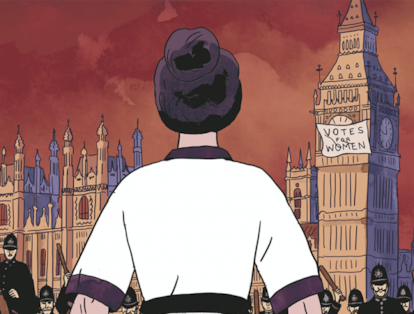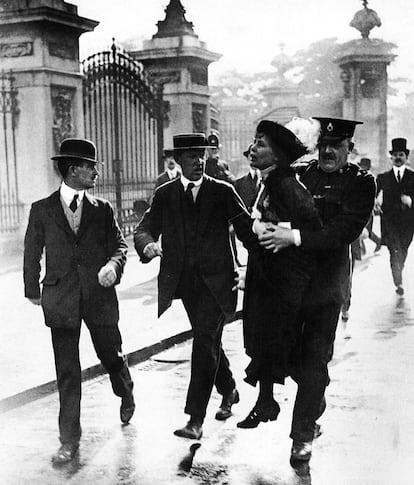Suffrajitsu: The women who used martial arts to fight for the vote
The graphic novel ‘Suffrajitsu: Mrs. Pankhurst’s Amazons’ narrates the story of the English feminists who opted for self-defense and direct action to claim their rights

“Please, sir, I want some more,” little Oliver Twist begged the cook who, stunned by the boy’s audacity, asked him to repeat what he had said. “Please, sir, I want some more,” replied Oliver, who was then threatened with a ladle until the directors of the workhouse decided that he should be hanged.
Although little Oliver was not executed by these criminals, the Dickensian scene demonstrates that rarely have oppressed groups won anything by politely asking the oppressors. This has been the case with Roman slaves, the Black Panthers, those confined to the Warsaw ghetto, the gay community and, of course, women suffragettes.
At the beginning of the 20th century, the Women’s Social and Political Union (WSPU) in England decided that the time had come to radicalize their protests to claim their right to vote. Although they would never put people’s integrity at risk, they would declare war on private property, which, according to their leader, Emmeline Pankhurst, was more valuable to some governments than human life.
One of WSPU’s first actions was to throw hammers into the windows of Oxford Street shops, causing extensive damage and inciting the anger of men who, terrified by any idea of change towards a more equitable society, did not hesitate to take the law into their own hands to defend their privileges. They began to attack feminist militants at rallies and demonstrations.
“In order to repel these attacks, some feminists decided to learn self-defense. To do this, they turned to Edith Garrud, who, together with her partner, was a pioneer in teaching jiujitsu in England,” explains the screenwriter Clément Xavier and the illustrator Lisa Lugrin, who learned about the feminist from the book Self-Defense by the sociologist Elsa Dorlin. “Most of us have heard of suffragettes protesting peacefully. However, the WSPU did not make the show and advocated forms of action considered violent because, as they themselves said, ‘Whoever wants to free themself must know how to fight.’ Despite the fact that using “violence” to be heard is taboo in our societies, it was thanks to this radicalization that the media broadcast their demands and that they obtained the right to vote 26 years before the French,” they explain.

Fascinated by the history of the WSPU militants, Xavier and Lugrin decided to create the graphic novel series Suffrajitsu: Mrs. Pankhurst’s Amazons.
“Howard Zinn said: ‘As long as rabbits have no historian, hunters will continue to tell history.’ That’s why women, racialized minorities and the popular classes tend to be erased from history in favor of, for example, kings. At the same time, these groups are also under-represented in the media or in political institutions,” explain Xavier and Lugrin. In the case of the suffragettes, all that changed when Emmeline Pankhurst’s daughter was expelled from a political rally. “She spat at a police officer who took her off the premises. The spit made the event to go viral, as we would say today, and, from then on, the WSPU understood that the only way to get their claims talked about, good or bad, was by using spectacular methods. And it worked.”
In addition to martial arts, the suffragettes used all the means at their disposal to assert their claims, from dressing in symbolic colors — violet for dignity, green for purity, white for hope — to using new media, such as film. “For decades, the reactionary media was not interested in the demands of the suffragettes. The few times they did report on it, the militants were caricatured as bitter old spinsters who couldn’t find a husband because they were too ugly. For this reason, the appearance of the cinema, a medium not yet fully controlled by the reactionaries, who by definition are little focused on innovations, offered new possibilities of expression to advance the cause of these women, such as making films that taught self-defense,” Xavier and Lugrin recount.
The English suffragettes ultimately got their demands met. The recognition of their rights, however, was not based on an ethical commitment to women, but rather because of the English industry’s need for labor during the First World War.
“That situation was a breaking point among the WSPU militants. Emmeline Pankhurst understood the benefits that women could derive from war, and she decided to support the war effort by agreeing with her former opponents. Many other activists, starting with her daughter Sylvia, for example, were viscerally pacifist and refused to follow that path. It’s horrible to think that it took a global bloodbath for women to have the right to vote, after World War I for the British and World War II for the French,” Xavier and Lugrin add.
Sign up for our weekly newsletter to get more English-language news coverage from EL PAÍS USA Edition
Tu suscripción se está usando en otro dispositivo
¿Quieres añadir otro usuario a tu suscripción?
Si continúas leyendo en este dispositivo, no se podrá leer en el otro.
FlechaTu suscripción se está usando en otro dispositivo y solo puedes acceder a EL PAÍS desde un dispositivo a la vez.
Si quieres compartir tu cuenta, cambia tu suscripción a la modalidad Premium, así podrás añadir otro usuario. Cada uno accederá con su propia cuenta de email, lo que os permitirá personalizar vuestra experiencia en EL PAÍS.
¿Tienes una suscripción de empresa? Accede aquí para contratar más cuentas.
En el caso de no saber quién está usando tu cuenta, te recomendamos cambiar tu contraseña aquí.
Si decides continuar compartiendo tu cuenta, este mensaje se mostrará en tu dispositivo y en el de la otra persona que está usando tu cuenta de forma indefinida, afectando a tu experiencia de lectura. Puedes consultar aquí los términos y condiciones de la suscripción digital.








































